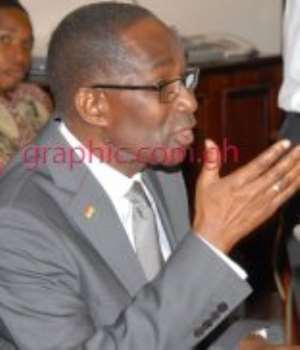
Public universities are gradually grinding to a halt as administrators and managers insist on continuing with their strike action that commenced on June 5, 2012.
General administrators, chartered accountants, lawyers, public affairs specialists, engineers, architects, planners, surveyors, land economists, procurement officers, librarians, medical officers, Information and Communication Technology (ICT) personnel and human resource managers, who form the membership of the Ghana Association of University Administrators (GAUA), are all on strike.
This has affected administrative work at the registry, payment of salaries and other incentives, medical facilities and hospitals at the universities, as well as the procurement of supplies, and this is likely to affect the processing of new entrants for the 2012/2013 academic year.
At a GAUA press conference in Accra, members said the Fair Wages and Salaries Commission (FWSC) had not shown good faith in its negotiations on market premium.
The National President of GAUA, Mr Gordon Mensah, who read a statement, said following representations to the FWSC in January 2012, grade points for their members were agreed on for their migration onto the Single Spine Salary Structure (SSSS).
He said in making proposals for a market premium, GAUA reiterated its stance on the need for the existing and time-honoured salary administration for all senior members of the universities, regardless of their designation, to be maintained to forestall distortions that might lead to disruptions in academic activities.
Thus, a commensurate market premium factor of 1.60 of the basic salary for its members was proposed.
After several reviews, the FWSC pegged the market premium at 0.80 at a meeting on May 7, 2012.
At the same meeting, he said its representatives realised that basic salary figures used in calculating the market premium was wrong and they provided the appropriate figures which, when used, put its members at a disadvantage.
Out of a membership of 622, a market premium of 0.80 would put 501 of its members at a disadvantage, as the bulk of them were within the junior and senior assistant registrar and analogous grades.
That would be against the principle not to make labour worse off in the implementation of the SSSS.
Justifying their market premium factor of 1.20 of basic salary, GAUA said the unique nature of the university, the need to forestall polarisation and unionisation of the public university system, the heterogeneous nature of the membership of GAUA, with lecturers, research fellows, librarians, resident tutors, tutors and technical instructors, all falling within its membership, necessitated the factor.
Moreover, he added, the minimum entry requirement for all senior staff members, both administrative and professional, were a Master’s degree, and, or a professional qualification in a relevant field, with two years post qualification experience.
That was also the same requirement for senior academic members.
Mr Agenim-Boateng said the argument by the FWSC that senior members (academic) were offered a market premium of 1.14 because of their entry requirement of a PhD was dishonest.
He said the FWSC had indicated that in applying a market premium factor for senior members (academic) of the public universities, it had been informed by the established fact that they already enjoyed the incentive as part of their salary package.
The senior members, therefore, had their basic salary, professional and special book allowances consolidated.
Mr Agyenim-Boateng maintained that for fairness, membership was expecting the same treatment from the FWSC in relation to their salary package.
He challenged the FWSC for assertions made that their migration was hinged on the availability of funds and that the Vice Chancellors of Ghana (VCG) had asked for GAUA not to be placed on the same market premium as UTAG.
He described these as unfortunate and asked the FWSC to substantiate the demands of the VCG.
GAUA said since the FWSC had admitted on May 21, 2012, at a meeting with the Minister of Finance and Economic Planning, that guidelines for the determination and application of appropriate and acceptable market premium for the various categories of staff had not yet been deliberated on by all stakeholders, it was imperative that pending the development, and for fairness and natural justice, whatever market premium arrived at was applied to all equally.
When questioned, GAUA said it had already followed processes for embarking on a strike action by communicating its intention to the National Labour Commission (NLC), but had received no response, while the FWSC said it had no mandate to continue negotiations on a market premium.




 There’s nothing you can do for us; just give us electricity to save our collapsi...
There’s nothing you can do for us; just give us electricity to save our collapsi...
 Ghanaian media failing in watchdog duties — Sulemana Braimah
Ghanaian media failing in watchdog duties — Sulemana Braimah
 On any scale, Mahama can't match Bawumia — NPP Youth Organiser
On any scale, Mahama can't match Bawumia — NPP Youth Organiser
 Never tag me as an NPP pastor; I'm 'pained' the 'Akyem Mafia' are still in charg...
Never tag me as an NPP pastor; I'm 'pained' the 'Akyem Mafia' are still in charg...
 Your refusal to dedicate a project to Atta Mills means you never loved him — Kok...
Your refusal to dedicate a project to Atta Mills means you never loved him — Kok...
 2024 elections: I'm competent, not just a dreamer; vote for me — Alan
2024 elections: I'm competent, not just a dreamer; vote for me — Alan
 2024 elections: Forget NPP, NDC; I've the Holy Spirit backing me and nothing wil...
2024 elections: Forget NPP, NDC; I've the Holy Spirit backing me and nothing wil...
 2024 elections: We've no trust in judiciary; we'll ensure ballots are well secur...
2024 elections: We've no trust in judiciary; we'll ensure ballots are well secur...
 Performance tracker: Fire MCEs, DCEs who document Mahama's projects; they're not...
Performance tracker: Fire MCEs, DCEs who document Mahama's projects; they're not...
 Train crash: Railway ministry shares footage of incident
Train crash: Railway ministry shares footage of incident
